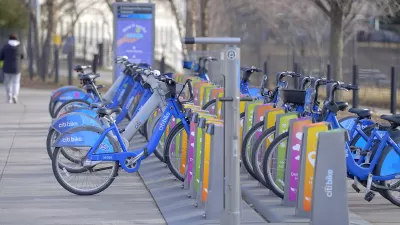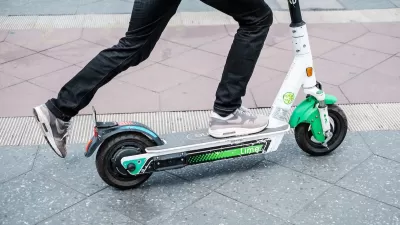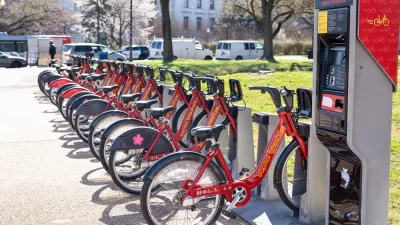According to a new NATO report, micromobility ridership in the U.S. was up 16% in 2023. Shared bike ridership set a new record, despite higher fares.

An article in Smart Cities Dive explores a report from the National Association of City Transportation Officials that found that in 2023, “shared bike ridership in the U.S. set a new record of 68 million rides, with dock-based bikes capturing the majority of rides at 61 million.” The report also found that e-bikes accounted for 46 percent of shared-bike trips. Could that indicate that e-bikes are a driving factor in increased shared bike ridership, possibly by opening the mode up to a wider number of riders and making longer trips more feasible?
Some additional interesting findings senior reporter Dan Zukowski identified in the NACTO micromobility report:
- Use of bike share and scooter share systems in US cities rose 16 percent in 2023 over the previous year to 133 million total rides, just shy of the all-time high of 136 million in 2019.
- “Dockless scooters accounted for 65 million rides in 2023, below an all-time high of 86 million in 2019.”
- The cost for riders has risen sharply over the last four years: since 2019, annual price passes are up 32 percent in Chicago, 30 percent in Boston and 21 percent in New York City.
- “Cities in the U.S. and Canada will tally 1 billion combined [micromobility] trips in the coming year.”
The trend has been confirmed in Washington, D.C., which broke records for single-day ridership in March. However, the same cannot be said for Houston's public bike share system, which just last month announced it would be ending operations after 12 years because of budget shortfalls, making it the largest city in the U.S. without a bike share network.
Zukowski concludes with the report’s advice to cities looking to foster continued success of shared micromobility: public ownership and subsidies to increase affordability for riders, elimination of sales tax on rides (similar to public transit fares), more protected bike lane networks, and increased proximity of micromobility stations and devices to homes and popular destinations.
FULL STORY: Micromobility ridership up 16% in US cities in 2023

Alabama: Trump Terminates Settlements for Black Communities Harmed By Raw Sewage
Trump deemed the landmark civil rights agreement “illegal DEI and environmental justice policy.”

Planetizen Federal Action Tracker
A weekly monitor of how Trump’s orders and actions are impacting planners and planning in America.

The 120 Year Old Tiny Home Villages That Sheltered San Francisco’s Earthquake Refugees
More than a century ago, San Francisco mobilized to house thousands of residents displaced by the 1906 earthquake. Could their strategy offer a model for the present?

LA’s Tree Emergency Goes Beyond Vandalism
After a vandal destroyed dozens of downtown LA trees, Mayor Karen Bass vowed to replace them. Days later, she slashed the city’s tree budget.

Sacramento Leads Nation With Bus-Mounted Bike Lane Enforcement Cameras
The city is the first to use its bus-mounted traffic enforcement system to cite drivers who park or drive in bike lanes.

Seattle Voters Approve Social Housing Referendum
Voters approved a corporate tax to fund the city’s housing authority despite an opposition campaign funded by Amazon and Microsoft.
Urban Design for Planners 1: Software Tools
This six-course series explores essential urban design concepts using open source software and equips planners with the tools they need to participate fully in the urban design process.
Planning for Universal Design
Learn the tools for implementing Universal Design in planning regulations.
Ada County Highway District
Clanton & Associates, Inc.
Jessamine County Fiscal Court
Institute for Housing and Urban Development Studies (IHS)
City of Grandview
Harvard GSD Executive Education
Toledo-Lucas County Plan Commissions
Salt Lake City
NYU Wagner Graduate School of Public Service




























